From the very first images of Narendra Modi being received by Anthony Albanese at Sydney’s Qudos Bank Arena, it was clear that the Indian Prime Minister was very much the star.
He just had that air about him.
The crowds inside erupted as both Prime Ministers made their entry, but it was on one of them that the cameras were focused.
The adulation, quite amazing to witness, prompted Mr Albanese to recall a similar previous visit to the venue to see rock star Bruce Springsteen, The Boss.
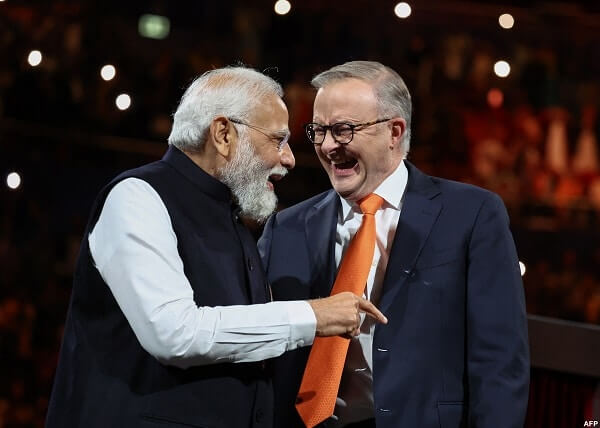
“Mr Modi is The Boss,” Mr Albanese said, giving the journos their headlines for the day.
As Mr Modi The Boss took to the podium at the event organised by the Indian Australian Diaspora Foundation (IADF), the audience of 20,000 of his countrymen went near delirious. They’d been chanting all afternoon, and the chants just got louder as the night went on.
And for them, he delivered.
It was the diaspora that was first and foremost on Narendra Modi’s mind.
“I promised you in 2014 that you won’t have to wait another 28 years for an Indian Prime Minister to visit,” Mr Modi said early in his speech. “I’m back, and I’ve brought with me with your Prime Minister, Anthony Albanese.”
Modiji spoke in Hindi. Mr Albanese listened in on earplugs, sharing them with NSW Premier Chris Minns). Foreign Minister Penny Wong had them too, but Leader of the Opposition Peter Dutton did not, and perhaps should have chosen to sit closer to MP Julian Leeser, who we know speaks the lingo.
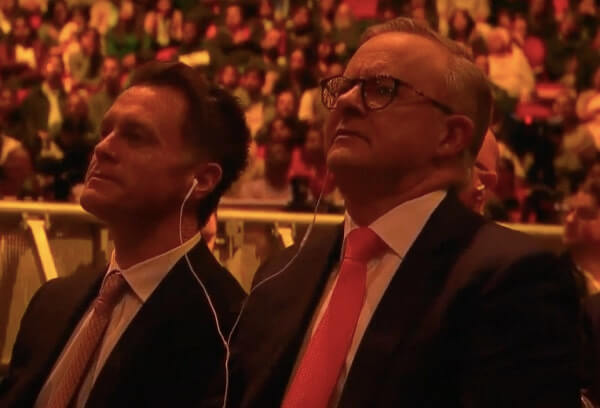
ScoMo was there as expected, given his close friendship with Modi – although we didn’t see Tony Abbott, who’s also a close friend. Besides both foreign ministers Penny Wong and Jaishankar, also in attendance were a whole host of state and federal ministers and MPs from both sides, basking in the Modi glow.
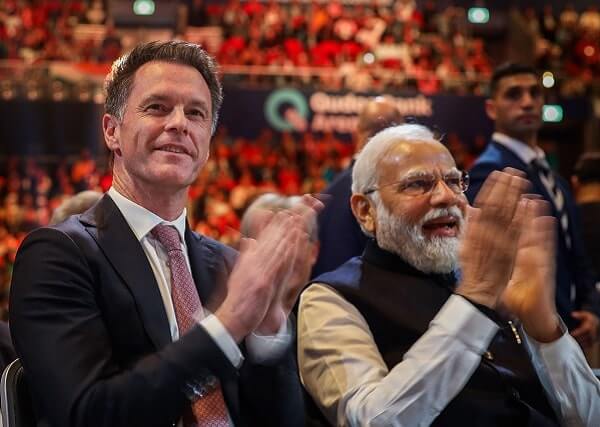
Among community attendees, anyone who’s anyone was there of course, choosing to wear traditional Indian, and eagle-eyed watchers spied singer Anup Jalota, currently on tour in Australia.
The address itself was classic Modi, or classic Diaspora Modi. Adept at talking to large crowds, the PM kept his speech simple, and replete with cultural references. Such as elements from our life here in Sydney’s Indian community: our favourite eating joints in Harris Park (actually naming two of them – Chatkazz and Jaipur Sweets are never going to live it down); the Indian names with which we light heartedly refer to Harris Park hotspots (much hilarity in the crowds); the brand new Lord Mayor of Parramatta Sameer Pandey; and significantly, the work that the community does, professionally as well as the exemplary voluntary endeavours at times of crises like bushfires, floods and lockdowns.
He also acknowledged the Australian government and people for embracing the Indian community. He loved that the Sydney Opera House was bathed in India colours on its 75th Independence Day; that a major recognition was given this month to an Indian-origin World War I soldier in Perth, and that Indian festivals are marked in Australia’s parliaments and local councils.
He thanked NSW for the Little India nomenclature at Harris Park, adding, “Thank you, my friend Anthony.” 45 per cent of the suburb’s 5,043 residents trace their roots to India.
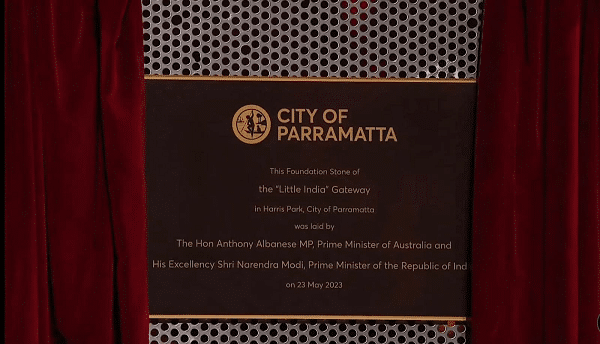
The Indian PM spoke also of how Australia has itself seeped into daily life back home in India – with cricket of course (the deep sadness that was felt at the loss of Shane Warne, and welcoming Australian women players at IPL); with MasterChef enjoying great popularity, and with regular connects with family members who have moved to Australia to live or to study. Sydney reception
The announcement of a Brisbane Consulate General of the Indian High Commission came with much applause. It is welcome news to the community there, and a long-standing request.
About the India-Australia relationship, Mr Modi didn’t talk a lot about the intricacies of the engagement in terms of trade and numbers and potential areas of mutual benefit. Instead, he stressed that mutual trust and respect form the foundation of the bilateral ties, and doubled down on his commitment to doubling the trade over the next five years.
The three Cs in our relationship are now passe, he suggested. “We’re moving on to the Ds and Es: Ds for Democracy, Diplomacy and Dosti (friendship), and Es for Economy, Energy and Education.” Words that will be repeated a few times in the near future, no doubt.
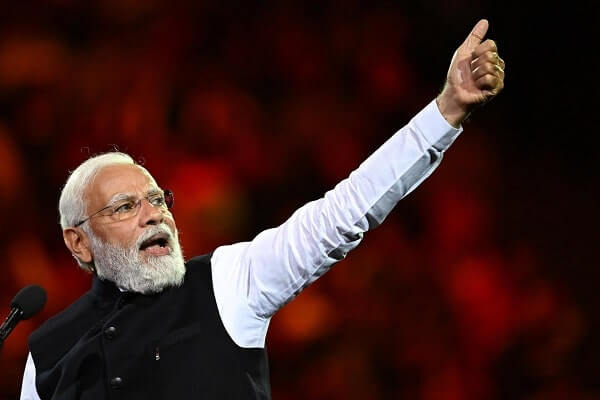
Narendra Modi was in his element, and had them eating out of his hand. All the classic Modi mannerisms were on display – the sturdy outstretched finger to make a point; the double arm raise to show strength, even the bear hug. Sydney reception
Despite his popularity, Mr Modi did see some criticism from a segment of the society. Protests took place outside the venue, with campaigners for an independent state in Punjab shouting anti-Modi slogans and waving flags of the so-called Khalistan movement. Additionally, a banned BBC documentary questioning Modi’s actions during the Gujarat riots two decades ago was aired within the Australian Parliament complex, organised by a group called “We the Diaspora.”
Prime Minister Modi also chose not to address the media throughout his visit, maintaining his practice of avoiding news conferences.
However, none of these issues mattered to his followers. The enthusiasm and support they displayed during the community reception, show the strong bond they maintain with their homeland. Modi’s ability to mobilise and energise his supporters within India and abroad remains a defining feature of his political persona.
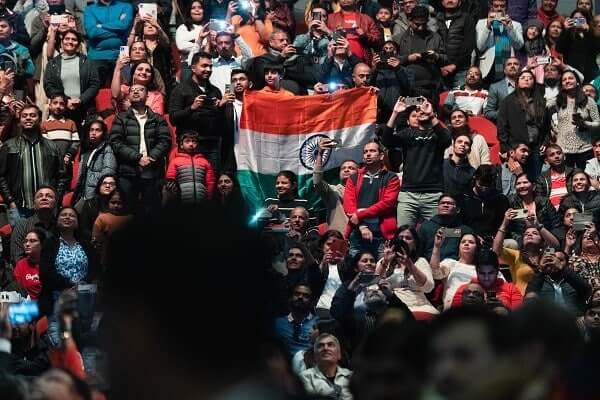
May I ask a favour of you all, the PM said at one point in his speech at the Sydney reception. Narendra Modi in Sydney
One man shouted back, “Aap jaan maangege to woh bhi haazir hai. (Ask for our life and we will give it to you).” Sydney reception
The favour in question was much simpler, thankfully. When you next visit India, Mr Modi said, bring an Aussie friend. (Jaan-haazir guy is in all probability rounding up his mates and preparing itineraries right now.)
Finally, the PM got down to brass tacks – what he has accomplished for India. He got the crowd truly roused up, at each listing of a dozen or so major achievements, from fintech to digital payments, from smart phone use and production to internet usage, from vaccination rates to even fruit and vegetable production. First in the world, he said for each, urging his listeners to repeat.
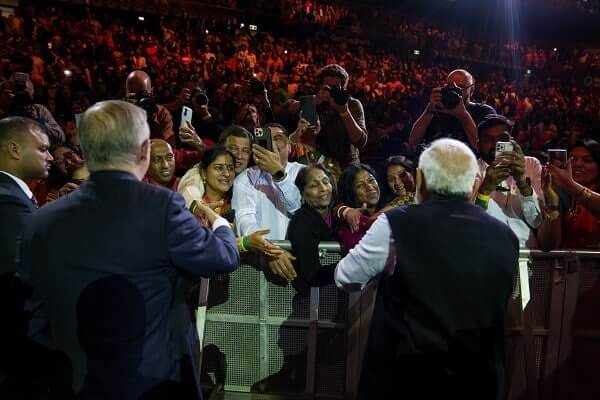
You could say it was all intended to instil a sense of national pride. Or you could call it electioneering, given its campaign-like vibes (India goes to the polls next year). Modi’s mega rallies outside of India and his close engagement with the diaspora have been seen as campaign tools, his own team apparently referring to them as “force multipliers”.
Either way, give them a booster shot of national pride, he did. It was what they came for, and he delivered. Narendra Modi in Sydney
See the Sydney reception here
READ ALSO: Highlights of Indian Prime Minister Narendra Modi’s Australia visit
